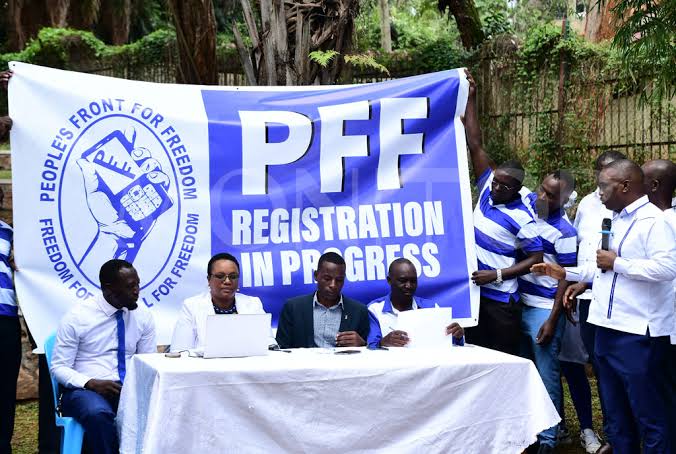After the long-standing mistrust amongst the Forum for Democratic Change party members that led to the creation of factions inside the party, the People’s Front for Freedom (PFF), led by Erias Lukwago, launched a nationwide signature collection campaign aimed at formalizing its registration as a new political party.
The event took place at the Katonga Road offices, where Lukwago, the interim president of the FDC Katonga faction, who doubles as the Lord Mayor of Kampala, outlined the campaign’s objectives and expectations.
While there is broad agreement that political parties play an important role in the consolidation of democracy, the dynamics of model relations and the form of political party activities with democratic principles are increasingly a concern in Uganda.
The process of institutionalizing democracy is ultimately largely determined by a number of factors, and the institutionalization of political party organizations is just as an integral part of the democratic system itself, whereby political parties are expected to exhibit the highest democratic transparency, like ‘free and universal’ participation of members to these organizations, which is not only a theory but a myth in all the key political parties in Uganda and the leading cause of mushrooming political parties and the collapse or weakening of the already existing political parties.
We expect to see the depersonalization and organizational differentiation of these political organizations by sole individuals or clicks of individuals, especially the party founders. For example, President Museveni in NRM, Bobi Wine in NUP, Besigye FDC, and the Obote family in UPC have always been ‘natural candidates’ and figures to these political parties who have monopolized these organizations.
Are we yet to see an end to the ‘political parties’ founder syndrome? I guess it’s a very lucrative venture for the proponents!
Arguing that political parties in Uganda are significantly an important tool of a consolidated democratic system, yet at the same time political parties are still weak institutionally is a wrong measure of democracy.
The parties rest more on the charisma of sole leaders or clicks of people, not on the modern organizational structuring system.
This also justifies the frequent occurrence of disunity in political parties that resulted in the emergence of political frustration among cadres and society and the process of democratic consolidation itself.
There have also been allegations of state owned political parties commonly referred to as payroll parties that are in place to only antagonize the political landscape for the rest of the players. This has resulted in a lot of mistrust in Uganda’s politics.
Does democracy mean political parties? What democracy means to a democrat, a liberal, or a political scientist is not the same meaning of democracy to an ordinary citizen, academic elites who are ignorant about political studies, or those elites who deliberately choose to become sycophants!
Broader democratic states democratize their leaderships and government institutions, ensure transparency and accountability, prioritize the rule of law, society equity, and economic equity.
Whereas to a layman, democracy may mean voting or holding elections, whether elections are organized by authoritarian regimes or lack transparency.
I’m still a worried Ugandan with strong fears that most citizens, most liberals, most politicians, and most academic elites could have understood the concept of democracy only when it has to deal with politics or elections.
Consolidation of democracy in Uganda should become the main political agenda of reform, other than focussing on mere electoral or constitutional reforms.
One of the main conditions of the realization of democratic consolidation is de-patronizing government institutions to create independence and meritocracy, a vibrant civil society, and free media.
In my view, whether electoral or constitutional reforms are less important is that the entire system is not democratized.
Is it the end of the beginning or the beginning of the end for the Mushrooming political parties in Uganda?















